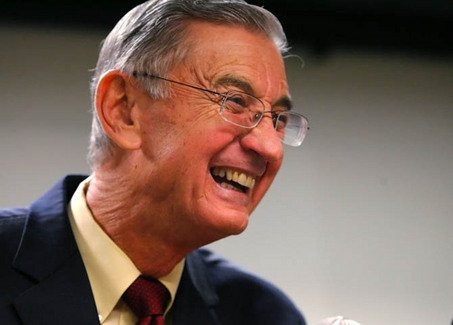Millard Fuller (1935-2009)
 Millard Fuller died early this morning.
Millard Fuller died early this morning.
He is a hero in the true biblical sense. He took the words of Jesus seriously. He gave up a small fortune, giving it all away in order to follow Jesus.
Millard and his wife Linda founded both Habitat for Humanity and The Fuller Center for Housing, both based here in Americus where I live. There has been a common misunderstanding that former President Jimmy Carter “started” Habitat for Humanity, which is not true. Jimmy Carter, who lives ten miles from Americus in Plains, became a Habitat volunteer in 1984 and has done much to champion Millard’s vision to eliminate poverty housing around the world. Carter called Millard “one of the most extraordinary people I have ever known.”
I had the opportunity of meeting with Millard exactly one month ago. I accepted an invitation to lead morning devotions for the staff on Wednesday, December 3, 2008. I shared some thoughts from Isaiah 9:6-7, prayed for the Fuller Center, and then spent about 10-15 minutes with Millard.
I had met him on a few occasions in various community functions, but I had never talked to him for any amount of time and certainly not in his offices, on his turf. I listened to him share stories describing what God was doing through the ministry. He told me my truck was “in sin” and could only be redeemed by a Fuller Center bumper stick. (I hate to admit that my truck has yet to repent.) More than anything, I had the wonderful privilege of drinking in his passion and charisma. Little did I know that this brief encounter would be the last time I would see Millard Fuller.
Millard’s passion reverberated with two themes: “the economics of Jesus” and the “theology of the hammer.” These two beliefs lived large in Millard’s heart and permeated the two organizations he founded. These two foundational beliefs are his legacy.
“The economics of Jesus”
At the core of Millard’s fundraising vision was a desire to put the teachings of Jesus into practice.
Things like:
- Give Jesus what you have, even if it is not enough, and expect God to come through with the rest
- Care for the poor, the least of these, and do profit from them
- Share resources (financial & material) with those in need
In his 2007 biography The House that Love Built, Bettie Youngs captures Millard’s thoughts on the economics of Jesus. “(Our) philosophy has always embodied the principle that each and every human being is priceless. We are to share what we have with ‘our neighbor,’ especially those in need. We are not to look down upon the poor. Scriptures are full of examples in which Jesus places enormous value on people whom society considers lowly. God’s grace extends equally to all humanity, whether they are considered ‘useful’ to us or not” (98).
“The theology of the hammer”
Millard’s often quoted “theology of the hammer” is the challenge to any form of Christianity made up of creeds without deeds. Millard and Linda were compelled to fulfill the promise of Deuteronomy 15:4, “There should be no poor among you, for in the land the LORD your God is giving you to possess as your inheritance, he will richly bless you.” The fulfillment of this promise for Millard was not found in merely talking about it, but doing something about it, namely picking up a hammer and nails and going to work building houses.
Millard had his ups and downs. He had his critics and his supporters. While living in Americus for nearly a decade I have heard from both camps. For me, I saw Millard as a passionate follower of Christ who had a passion to do the work of the kingdom of God. He will be missed, but he will not be forgotten.